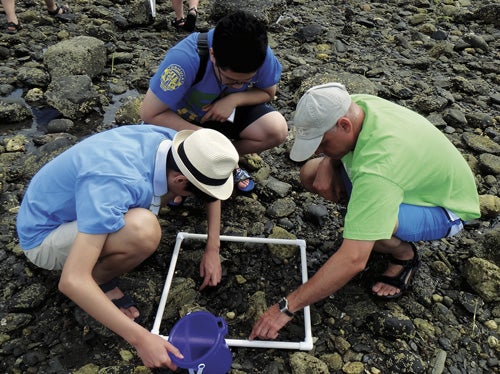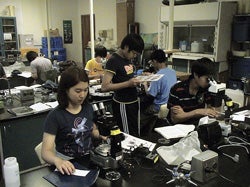The Korean Connection

Thirty-two students from an accelerated high school in South Korea spent two weeks in July at the Graduate School of Oceanography learning the principles of oceanography and participating in hands-on science activities in and around Narragansett Bay.
The visit is part of GSO’s International Oceanography Explorers program coordinated by its Office of Marine Programs.
From July 4 through14, the Korean students conducted beach profile surveys, observed a fish trawl, collected plankton and sediment samples, conducted laboratory analyses, and toured a fish hatchery, a research aquarium, and other facilities at URI. They also went on a whale watch and toured the aquaculture lab at Roger Williams University.
“The students are here because of their interest in oceanography and their desire to learn in an international setting,” said Maryann Scholl, the program’s coordinator at the Office of Marine Programs. “They get to improve their English language skills while getting a solid introduction to the science and practice of oceanography.”
 The teachers in the program are former GSO student and Roger Williams Professor Scott Rutherford, current GSO student Daniel Whitesell, recent URI graduate Christine Newton, and science educator Jill Johnen. The program was designed specifically to meet the interests and needs of the Korean students.
The teachers in the program are former GSO student and Roger Williams Professor Scott Rutherford, current GSO student Daniel Whitesell, recent URI graduate Christine Newton, and science educator Jill Johnen. The program was designed specifically to meet the interests and needs of the Korean students.
“There is a growing interest in oceanography in South Korea,” said David Smith, associate GSO dean, “and we have a number of informal collaborations with scientists and universities there.”
Jae-Hun Park, an associate marine research scientist at GSO who has recently taken a position at the Korean Ocean Research and Development Institute, plans to continue his collaboration with GSO. Smith noted that there are many more opportunities to collaborate with scientists at the Korean institute, and having Park there will facilitate these efforts.
Oceanography Professor Isaac Ginis has been collaborating with scientists in Korea on the study of tropical cyclones for more than 10 years. The Korean Ocean Research and Development Institute is funding Ginis’s research to develop a typhoon prediction model for the Korean Meteorological Agency, and he has organized two workshops in Korea on the interaction between typhoons and the ocean. As a result of this work, a Korean student came to GSO to work as Ginis’s postdoctoral researcher and now teaches at Jeju National University, and another student enrolled to earn his Ph.D. with Ginis.
Two other students from Korea are presently enrolled at GSO as well, and several faculty members are conducting research in the East China Sea adjacent to Korea. They are studying the circulation patterns of the Kuroshio current and extension, which carries warm water from the western South Pacific to the north, somewhat like the Gulf Stream in the Atlantic.
By Todd McLeish
 Home
Home Browse
Browse Close
Close Events
Events Maps
Maps Email
Email Brightspace
Brightspace eCampus
eCampus


